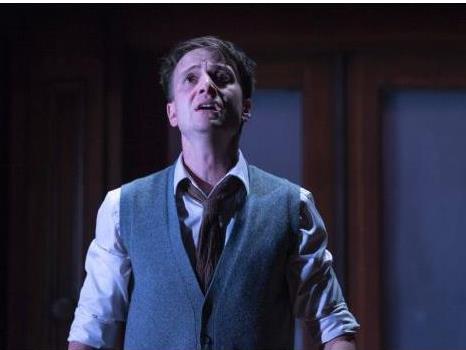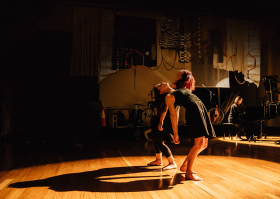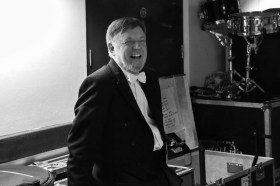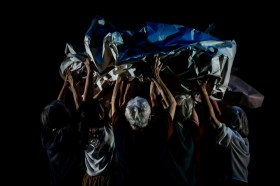As his final piece of work, George Orwell’s dystopian nightmare has only increased in prominence since its first publication in 1949. Trump’s election resoundingly propelled 1984 to the top of the bestseller list once again, demonstrating the public’s never-ending fascination with the novel and its ever prescient themes of the totalitarian state.
Robert Icke and Duncan MacMillan’s stage adaptation of the story only serves to illustrate the perpetual relevance of the story to what has all too quickly been dubbed the post-Trump era. With concepts such as ‘doublethink’ and ‘thoughtcrime’ at risk of becoming reality and the erasure of history falling consequence to the regime’s accusations of alternative facts, the present serves as an eerie reminder that state-sponsored control is a constant threat. It is against this backdrop of increasing government surveillance and diminishing concerns for individual privacy that create a ripe setting for an audience enthusiastic to engage in the issues posed by 1984.
Strategically timed at 101 minutes, the production falls distinctly into two halves – the build-up of the main characters, Winston and Julia’s relationship, followed by the eventual discovery of the relationship and grisly interrogation of Winston in Room 101. An esoteric start to the play frames the events as a book club discussion analysing Winston’s diary, held some time in the distant future. The discussion occurs simultaneously between the minor characters sitting around a long board table on which Winston scribbles his diary entries from the other end. The setting soon morphs into an austere office environment reminiscent of the 1950s communist era with the drab clothing of characters creating a historic feel to the piece.
The first few scenes follow a groundhog day-esque format with a dowdy Paul Blackwell as Parsons leading the water-cooler discussion about his faith in children being the eyes and ears of the Big Brother regime. It is only when Julia brazenly reaches out to Winston to join her in a clandestine, out-of-town rendezvous that the characters seem to settle into their respective roles. As a narrative, the structure of the play is unnaturally clunky and overly dramatic. The relationship between Winston and Julia fails to organically ripen but rather suddenly lurches into action after they arrange to meet secretly in the back room of an antique shop, a place where they can indulge in forbidden treasures such as real coffee and chocolate.
The performances are solid with a young Tom Conroy playing a confused, doe-eyed Winston. Ursula Mills captures some of the rebelliousness of Julia but the stilted nature of the script means its takes some time for her to settle into the role. The latest interpretation of George Orwell’s timeless classic is a collaborative production that had its genesis on the Nottingham theatrical circuit. From there the show has toured to critical acclaim performing on London’s West End and Broadway. Adapted by Associate Director, Corey McMahon, to feature an Australian cast, the translation is no less effective for the Australian context. The set production itself is an impressive arrangement. A live video projection occupies the entire top half of the stage backdrop, capturing the intimacy of the covert couple’s love den hidden in the rear of the stage. The stage itself is bordered by intense floodlights which there is no hesitation in deploying to blinding effect to hammer home the brutality of the regime.
Using shock and awe tactics of blinding light and blasting sound to intersperse various scenes creates the expected dramatic effect, particularly when proclaiming Big Brother’s declarations during the first half. However the pounding impact of these mechanisms serves as somewhat of a distraction to the subtlety of Orwell’s original concept, that the instillation of fear and surveillance by Big Brother was constant and ingrained. Rather, this production creates a heightened crescendo of tension within each scene, lending a sense of melodrama to the overall flow. The dependence upon the confrontational element in the script is evident with the sudden betrayal of Winston and Julia’s relationship. With the blast of sirens erupting upon the stage, several protective suit clad Thought Police transform the backdrop instantly to the clinical setting of Room 101, completely disassembling the secret backstage room. While these sudden changes in tempo create the element of surprise at every turn, the corollary effect is to create a disjunctive impression to the narrative.
Already smashing through box offices in South Australia, New South Wales and Victoria, the season run in Canberra, in a week that saw the announcement of a homeland affairs style super ministry, was a fitting tribute to a play that queries the boundaries between personal freedom and state-sponsored oppression. Already attracting attention for reports of vomiting and fainting in the audience, the play is not pleasant, but compelling viewing. Just as the novel was written as a parable of political events to question the potential overreach of centralised state regimes, so this 1984 production captivates the essence of indoctrination, while also representing the glimmer of hope that such episodes in history will only be temporary.
3 1/2 stars out of 5
1984
Performing at the Canberra Theatre
25 – 29 July 2017





